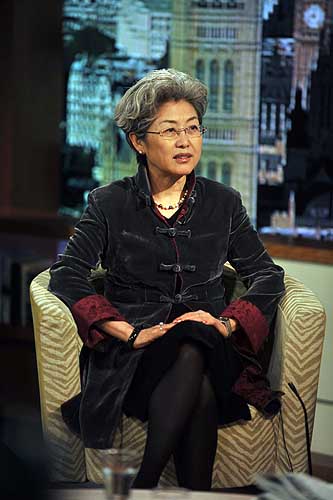|
 |
|
Fu Ying, Chinese Ambassador to the Britain |
The splendid fireworks of the Beijing Olympics are seen as marking China's ascendance to world power status.
Chatham House, Wilton Park, the Financial Times and The Economist, together with many American publications, are all talking about China as a power.
An international consensus is emerging that China is a world power. There is, therefore, a lot of scrutiny about the rights and wrongs in China and what China should and should not do.
Fred Bergsten, Director of the Peterson Institute for International Economics, first suggested the idea of the G2.
[Zbigniew] Brzezinski stated that China is second only to the United States. A survey in Europe at the end of 2007 echoed his view, as 80 percent of respondents believed China has become the No. 2 world power.
Clearly China is moving from the margins to the center of world politics.
There are some loudly expressed concerns about what kind of power China will become. I am often asked during speech occasions: As it grows stronger, would China impose its will on others?
But is China a power? The response of the Chinese people is very different.
Most of them still see China still as a developing country. A popular saying in Chinese is huyou, meaning to sweep China off its feet.
Last January, I hosted a debate at my embassy. The topic was "China's international status."
About 140 people came, including embassy diplomats, businesspeople and journalists stationed in London.
It was the most heated debate I've had with my fellow Chinese.
A young man kicked off the debate by saying that China is a world power second only to the United States.
He was challenged by almost the whole crowd. People spoke one after another, citing statistics and problems in China to argue that we are just another developing country.
I then asked, "Who would agree with the him?" I saw only four hands.
That means only five people, including the gentleman himself, were of the view, or less than 4 percent of the participants shared Brzezinski's perception.
Then I asked the crowd, "Which country do you think is the No. 2 power in the world?"
They answered almost without hesitation, "Russia."
"Which is the third?" "Germany."
"The fourth?" "Great Britain."
When it came to the fifth, some said France, and some said it could be China.
Though such generalized way of ranking cannot be an accurate reflection of the complex positions and circumstances of different countries. Yet this discussion can reflect the general thinking of the Chinese people.
Are we right, and is the world wrong?
There are clearly facts to support both arguments.
Many years ago, when Mr. Deng Xiaoping was summarizing China for a foreign visitor, he said China was both "big and small, strong and weak." This remains true of today's China.
People outside China tend to see the big and strong aspects of China, while inside China, we are more aware of its weaknesses and challenges.
Let me compare some statistics about China and the UK to illustrate the two dimensions of China.
—China's gross domestic product (GDP) ascended to third place in the world in 2008, and is expected to rise to No. 2 in the near future. The UK's ranking fell to No. 6.
However, in per-capita terms, China has only $3,000, making it No. 104 in the world, while the UK has about $46,000, 15 times higher, ranking 20th.
This means UK citizens have a much higher standard of living.
—In terms of trade, China is the third largest in the world, the UK No. 8. However, the UK's services trade is No. 2 in the world and China is just developing the services sector.
—By the end of March, China's foreign currency reserves were 30 times that of the UK. Among the 10 biggest banks in the world, four are from China and one is from the UK.
The market value of ICBC [Industrial and Commercial Bank of China] can buy two HSBCs, still with a bit of surplus.
However, London is a global financial center with about 550 foreign banks and 170 international securities firms.
Among the top 500 companies in Europe, 100 have their headquarters in London.
—The UK is a post-industrial society and urban residents make up 90 percent of the population.
China is in the early phase of industrialization and urbanization. Sixty percent of its population is rural, and 135 million people still live on less than $1 a day.
The list could go on and on.
The Chinese premier once remarked: Any small problem in China can grow into a huge one if multiplied by 1.3 billion. A big achievement can become too tiny to notice once divided by that number.
What is China's target, then? What are we trying to achieve? It is hard to generalize.
To put it in simple terms, we are hoping to develop China into a country with prosperity, democracy and rule of law and a country that works for peace and cooperation in the world.
The Chinese pursuit of prosperity is to enable everyone to have a roof over his head, every child to be in school, the sick to have access to medical care and the elderly to be taken care of. That is now within our grasp.
For the first time in history, people are not dying of hunger in China.
Even when I was in college, the greeting words for people meeting each other on the street were not "How are you?" but "Have you had your meal?" Food was the biggest concern for families and the government.
Now if you ask young people like my daughter, "Have you had your meal?" they would think you have a problem.
I met an American couple who just came back from Shanghai and they think the Shanghai skyline is surreal.
| 